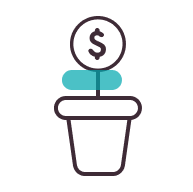It goes without saying that small business owners are experts at multitasking. If you own a small business, chances are you’re juggling a million different things on a daily basis — shift schedules, inventory management, and likely, a multitude of different expenses, from electricity bills to insurance payments.
With so much to do and manage, it is possible that you may have forgotten about a credit card bill, missed a loan payment, or let an invoice slip through the cracks. While this may not seem like a big deal, and it certainly isn’t the end of the world if you’re a few days behind, a past due debt can come back to haunt you when you’re applying for business funding.
If you find yourself falling behind on payments, don’t fret just yet. Here’s what you need to know to about past due debts, plus some steps you can take to resolve them so you can get back to what’s most important — growing your small business.
What is past due debt?
A debt becomes “past due” if you fail to make a payment as of the due date. The “past due” amount is the balance that was owed on the original due date.
For example, let’s say you have a small business credit card that you use to purchase inventory. The holidays are right around the corner, and decide to stock up on additional supply to meet the surge in demand. You owe a balance of $10,000 with a minimum payment due of $300 on the 15th. You’re planning on paying it off in full once you’ve sold all of your holiday inventory, and you have more cash on hand. But with things so busy, you completely forget to pay the minimum — which means during the next payment period, your minimum payment will include:
- Past due minimum payment of of $300
- Any late fees or penalties
While this may seem like a small number, it can quickly balloon out of control with the addition of late fees, penalties, and in some cases, an increase in interest rate. And if you’ve missed a loan payment or fail to make good on an invoice, you’re likely looking at an even more daunting number.
How does a past due debt affect your credit score (and your chances of getting a loan)?
Most of the time, it comes down to how far behind you are on a payment and the type of debt. If you’re a few days late on paying your credit card bill, you’ll most likely just face a late fee, however, once you become 30 days past due, your creditor will likely report you to the credit bureaus. And once you’re 60 days past due, your creditor may even increase the interest rate — which can make paying off what you owe even more overwhelming.
This is where your credit score is at risk, and potentially, your chances of being approved for a small business loan.
Credit bureaus collect information about customer credit data, both personal and business, and lenders use these numbers to evaluate how risky you are as a borrower. While each credit bureau has its own criteria and method of scoring, a combination of the amount of available credit you use, the length of your credit history, the types of credit you use, and your payment history, among other factors, all play a role.
In fact, when it comes to your FICO (Fair Isaac Corporation) score, which is arguably the most popular scoring system in the US for personal credit, payment history is the biggest factor — accounting for approximately 35% of the formula. And for many types of small business financing, your personal credit score can make or break your chances of getting approved — especially for younger businesses without an established business credit score.
How to resolve past due debts
Have a lingering past due debt? Here’s a few ways you can go about handling them:
- Make the past due payment: This may be an obvious option, but it’s also the most straightforward approach to get rid of a past due debt that is looming over your head.
- Negotiate a payment plan with your creditor: Due to late fees and interest charges, you might find yourself in a situation with an ever-increasing balance that you just can’t seem to shake off. In some cases, your creditor may be willing to set up a payment plan so you can gradually pay off what you owe.
- Consolidate your business debts: With business debt consolidation, you can combine multiple business debts, including those that may be carrying a past due balance, into one single, streamlined payment. By paying off your past due debt, you can avoid continuing to pay penalties or increased interest charges.
This article was originally written on May 31, 2019 and updated on November 12, 2020.



Have at it! We'd love to hear from you and encourage a lively discussion among our users. Please help us keep our site clean and protect yourself. Refrain from posting overtly promotional content, and avoid disclosing personal information such as bank account or phone numbers.
Reviews Disclosure: The responses below are not provided or commissioned by the credit card, financing and service companies that appear on this site. Responses have not been reviewed, approved or otherwise endorsed by the credit card, financing and service companies and it is not their responsibility to ensure all posts and/or questions are answered.